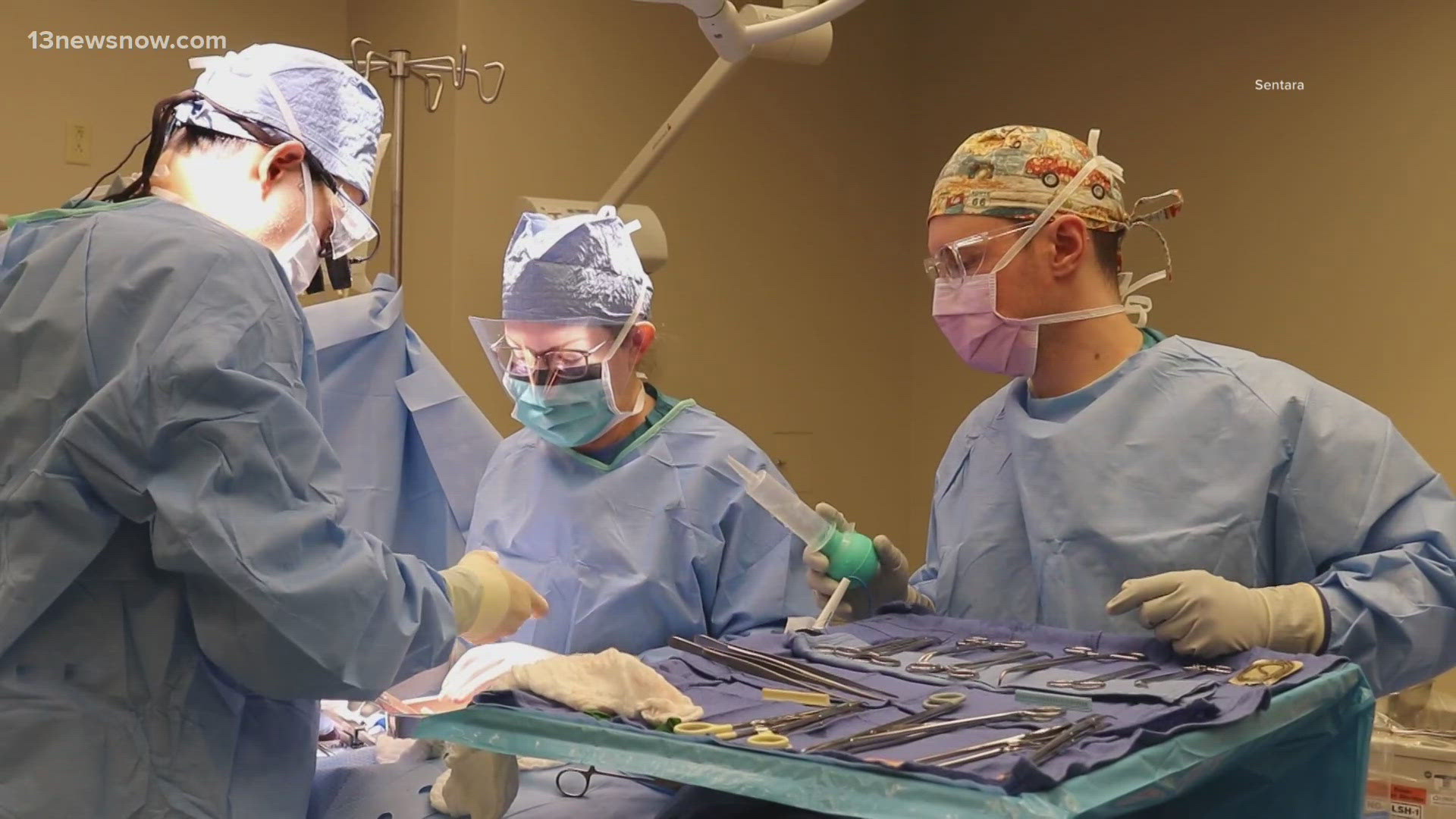NORFOLK, Va. — It was Valentine's Day in 2020 when Stanley Norris of Hampton planned to take his wife, Patsy Williams-Norris, out to dinner.
But he became winded and started struggling to breathe. The Hampton couple ended up at the hospital instead.
After a series of tests, doctors told Norris he had pneumonia. But that wasn't the only news they had for him.
"They did [an] ultrasound on my kidneys, and they realized that I was born with only one kidney," Norris said, "and it was double the size of a normal kidney because it was trying to compensate."
Norris began home dialysis about two months later. By that summer, he was placed on the national kidney transplant waitlist, where he would remain for about three years.
In the meantime, family members agreed to be tested as potential living donors. But as a non-blood relative, his wife didn't immediately sign up.
"I had no idea that I could potentially have been a match for him," Williams-Norris said.
It wasn't until September 2023 that she decided to undergo testing.
"My initial wanting to do it [was so] I would donate to someone else," Williams-Norris said. "Because if you donate on behalf of someone who's waiting, they get pushed up on the list."
Days later, she received a call that she was indeed a match — not for a stranger, but for her husband.
"My surgeon said after 33 years, this is only the third time he saw a husband and wife match," Norris said.
Three months later, the transplant surgery was complete.
"She has my rib, and I have her kidney," Norris said.
How outdated assumptions affected kidney transplant waitlist
Meanwhile, the United Network for Organ Sharing, which oversees the organ allocation and transplantation process in the U.S., reports that 89,334 people across the United States are still waiting for a kidney.
And there is a severe shortage of kidneys available for transplant.
"[Patients are] evaluated and cleared to be put on a [wait]list, and they can wait on the list anywhere from one year to five years, depending on their blood type," said Dr. Thomas McCune, professor of medicine at Eastern Virginia Medical School and a member of the transplant program at Sentara Norfolk General Hospital.
Kidney transplant candidates make up more than 85% of all patients in need of an organ transplant.
A person's location on the transplant waitlist is driven by specific criteria, including factors in a kidney function test called the estimated glomerular filtration rate, or eGFR.
"The [eGFR] formula that we were using up until 2022 took into consideration a blood test called creatinine, the patient's age, sex, and race," Dr. McCune said. "If your kidney function is below 20% based on this formula, you can then be referred to a transplant program and evaluated for a preemptive listing."
The inclusion of race in the algorithm was based on outdated assumptions about kidney function in Black patients.
"The formula suggested that people who were African American or Black had a higher kidney function at any single time than a person who, if you put in the factor that they were white," Dr. McCune said. "If they put in the factor of white, [it] would say their GFR was 20, which would qualify them for evaluation for a preemptive kidney transplant. But if you put in the factor Black, it would move them up to 23, which would not allow them to be considered at this time."
As a result, a Black patient's eGFR number may have placed them lower on the transplant waitlist or prolonged the time before they made the list at all.
New policy removed race variables from kidney transplant candidate evaluation
29.7% of people in the U.S. waiting for a kidney transplant identify as Black. In Hampton Roads, Dr. McCune said that number is even higher.
"In the Hampton Roads area, about 60% of the people on the kidney transplant waitlist are African American," Dr. McCune said.
But in 2022, UNOS implemented a policy that effectively removed race variables from kidney transplant candidate evaluations.
RELATED: A biased test kept thousands of Black people from getting a kidney transplant. It's finally changing
Last year, the organization ordered hospitals to assess and backdate the waiting times of Black patients already on the waitlist based on race-neutral calculations, moving them up the list and potentially increasing their chances of receiving a kidney.
Norris said he's glad to see that more people have a better chance of getting the surgery that may have saved his life.
"If it weren't for God in my life, I don't think I could've got through this," Norris said. "Now, I've been educated about the process and how important donation is, and I am an advocate, I am a voice, especially in the African American community."
Since January 2023, UNOS reports that 14,531 Black kidney transplant patients in the U.S. have been credited for lost waiting time by an average of 2.3 years.
3,232 of them have since received a kidney transplant.
A new proposal is also in the works to remove factors like race from calculations determining the quality of a deceased donor kidney. The board of the Organ Procurement and Transplantation Network, a UNOS program that manages organ donation and transplantation logistics, plans to consider those changes in June.

